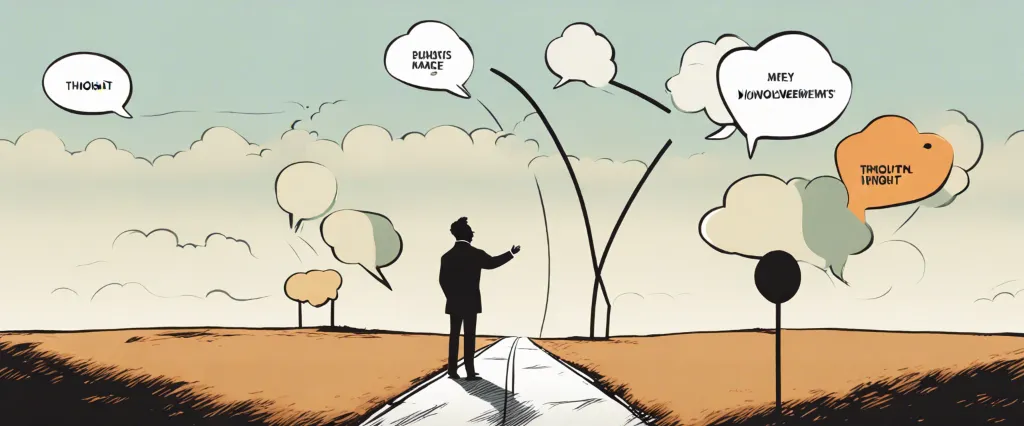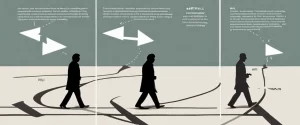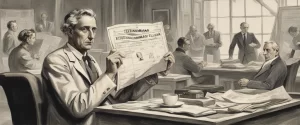
Literature has the remarkable power to transport readers to alternate realities, where the familiar and the bizarre intertwine to shed light on the human condition. In this comparative study, we delve into two iconic works of fiction that challenge our understanding of society and individuality – “The Metamorphosis” by Franz Kafka and “Animal Farm” by George Orwell. Through their unique narrative styles and thought-provoking allegories, both authors explore the complexities of human existence within surreal and oppressive worlds.
The Metamorphosis” unfolds the tragic tale of Gregor Samsa, a dutiful son who awakens one morning to find himself transformed into a grotesque insect. Kafka’s narrative perfectly captures the unease experienced by both Gregor and his family as they grapple with the sudden alteration in their lives. The novella seeks to explore themes of isolation, alienation, and the loss of identity, forcing readers to confront a world that rejects individuals who deviate from the norms society imposes.
On the other hand, “Animal Farm” presents a scathing critique of political systems through the lens of a seemingly innocent farmyard setting. Orwell masterfully uses anthropomorphic animals to depict the rise and fall of a revolutionary movement, exquisitely illuminating the corrupting nature of power. By delving into the inner workings of society, the author carries readers through the experiences of the farm animals, revealing the consequences of collective action and its potential to result in tyranny.
Each work, although distinct in form, offers profound insights into universal themes. Kafka and Orwell intertwine the fantastical and the real to reveal unsettling truths about human nature, societal structures, and the dynamics of power. By highlighting the struggles faced by their respective protagonists, these authors invite us to question our own lives, our roles within society, and the inherent flaws in the systems we uphold.
The purpose of this comparative study is to examine the striking similarities and subtle differences between “The Metamorphosis” and “Animal Farm.” We aim to explore the profound impact of these narratives, tracing their overarching themes, examining their distinct literary styles, and analyzing how both authors employ symbolism, allegory, and dark humor to convey their powerful messages. Through this exploration, we aim to unveil the profound lessons embedded within these works, lessons that remain relevant and profoundly resonant even decades after their publication.
In the following chapters, we will embark on an insightful journey, traversing two distinct yet interconnected worlds crafted by Kafka and Orwell. By studying the unsettling and thought-provoking journeys of Gregor Samsa and the oppressed farm animals, we will uncover hidden parallels and dichotomies, ultimately gaining a deeper understanding of the mechanisms that control and shape our own reality.
This comparative study serves as an invitation to reflect on the power of literature to challenge conventions, provoke discourse, and ignite the imagination. Join us as we unravel the enigmatic narratives of “The Metamorphosis” and “Animal Farm,” and embark on an exploration of the human condition within surreal worlds.
Brief Summary of Two Books
The Metamorphosis by Franz Kafka
The Metamorphosis” by Franz Kafka is a novella that tells the story of Gregor Samsa, a traveling salesman who wakes up one morning to find himself transformed into a monstrous insect-like creature. As Gregor grapples with his new form, he becomes isolated from his family who initially supports him but eventually rejects him. His metamorphosis forces Gregor to confront the harsh reality of his existence as he becomes a burden on his family and is treated inhumanely. Through Gregor’s transformation, Kafka explores themes of alienation, identity, and human condition, raising profound philosophical questions about conformity, personal autonomy, and the meaning of life.
Animal Farm by George Orwell
Animal Farm” by George Orwell is a satirical allegory that depicts a group of farm animals revolting against their human owner in an effort to establish an egalitarian society. The story unfolds in Manor Farm, where the animals led by the pigs, Snowball and Napoleon, overthrow Mr. Jones, the owner. Initially, the animals strive for equality and a system based on seven commandments known as Animalism, which forbid the animals from acting like humans. However, as time goes by, the pigs, particularly Napoleon, gradually take control and corrupt the principles of Animalism. They rewrite the commandments to suit their interests and increase their privileges while the other animals suffer. Napoleon becomes an authoritarian leader, using propaganda, manipulation, and fear tactics to maintain his power. As the animals work harder under bad conditions, the ideals of the revolution are forgotten, and the pigs become more like the oppressive human farmer they once rebelled against. In the end, the animals realize that they have exchanged one form of tyranny for another, as the pigs and the humans become indistinguishable. The novel serves as a critique of the corruption of power and a warning about the dangers of totalitarianism.
Comparison between Two Books

Similarities in Humanity
Both The Metamorphosis by Franz Kafka and Animal Farm by George Orwell explore the theme of humanity in their respective works. Despite being different in terms of genre and narrative style, these two novels depict the struggles and complexities of the human condition in similar ways.
1. Loss of individual identity: In both books, there is a sense of lost identity among the characters. In The Metamorphosis, Gregor Samsa wakes up one morning transformed into a gigantic insect, causing him to lose his human form and leading to isolation from his family. Similarly, in Animal Farm, the animals lose their individual identities as they are reduced to mere names and numbers, symbolizing how power structures strip them of their individuality.
2. Themes of alienation: Both novels portray individuals or groups that become isolated from society. Gregor Samsa experiences profound alienation within his own family and society after his metamorphosis. In Animal Farm, the pigs, who initially lead the revolt against humans, gradually alienate themselves from the other animals and establish an oppressive regime. This sense of isolation represents the wider human experience of being disconnected from others and society.
3. Symbolism of oppression and control: Both novels use powerful symbolism to highlight the impacts of oppressive forces. The insect-like transformation in The Metamorphosis represents the dehumanizing effects of capitalism and the pressures of conformity. Likewise, Animal Farm symbolically represents the rise of totalitarianism, with the pigs representing oppressive leaders who manipulate and control the other animals for their own benefit. These symbols highlight the destructive tendencies of power and its ability to exploit the vulnerable.
4. Reflections on human nature: Both Kafka and Orwell implicitly comment on human nature in their works. The Metamorphosis reflects on themes of selfishness, indifference, and the loss of compassion, as Gregor’s family gradually rejects and abandons him. In Animal Farm, Orwell critically examines themes of greed, corruption, and the potential for power to corrupt even the noblest intentions. Both books examine how human nature can be flawed and susceptible to negative influences.
In conclusion, while The Metamorphosis and Animal Farm may differ in their settings and narrative techniques, they both delve into similar themes regarding humanity. Both explore the loss of identity, alienation, the symbolism of oppression, and reflections on human nature. These novels serve as cautionary tales, prompting readers to reflect on the complexities of the human condition and the potential pitfalls of societal structures.
Divergences in Humanity
The Metamorphosis by Franz Kafka and Animal Farm by George Orwell are both classic literary works that delve into societal critiques. Although they differ in terms of genre and themes, they both highlight the divergence about humanity in unique ways.
The Metamorphosis tells the story of Gregor Samsa, a man who wakes up one morning to find himself transformed into a gigantic insect-like creature. As the story progresses, Gregor’s insect form becomes a metaphor for his isolation and alienation from society. Kafka delves into the themes of dehumanization and the human capacity for empathy. Despite Gregor’s shocking transformation, his family surprisingly fails to connect with his humanity. Instead, they view him solely as a burden, using him for financial support while rejecting him emotionally. This divergence regarding humanity showcases how societal norms and expectations can erode empathy and compassion, reducing individuals to mere economic entities.
On the other hand, Animal Farm is an allegorical novel that uses a group of animals overtaking a farm as a representation of the Russian Revolution and its aftermath. George Orwell portrays various animals that represent different social, political, and human traits. The book focuses on the corruption of power and the manipulation of language to uphold and justify exploitative systems. The divergence about humanity in Animal Farm lies in the portrayal of the pigs, who initially lead the revolution with the promise of equality and a better life for all animals. Gradually, however, they become corrupted and adopt human-like behaviors, indulging in luxury and ruling over the other animals with cruelty. Orwell’s portrayal of the pigs exemplifies the dangers inherent in human nature: the lust for power, the temptation to exploit, and the ability to resort to oppression to maintain authority.
While both works discuss the divergence about humanity, they approach it from different angles. The Metamorphosis emphasizes the dehumanizing consequences of societal expectations, while Animal Farm highlights the corrupting influence of power and the potential for oppression within human nature. Overall, these novels ultimately serve as cautionary tales, reminding us of the dangers that can arise when humanity loses sight of empathy, compassion, and equality.

Conclusion
Both “The Metamorphosis” by Franz Kafka and “Animal Farm” by George Orwell are significant and thought-provoking works of literature that are worthy of reading. However, the preference for one book over the other largely depends on personal interests and the themes one finds more intriguing.
“The Metamorphosis” is a surreal and introspective novella that tells the story of Gregor Samsa, who wakes up one morning to find himself transformed into a giant insect. Kafka explores themes such as alienation, identity, and the absurdity of human existence. The book delves into the complexities of familial relationships and the psychological effects of isolation, making it a compelling read for those interested in existential literature.
On the other hand, “Animal Farm” is an allegorical novel that presents a critique of totalitarianism and explores political corruption. Orwell uses a farm setting and anthropomorphic animals to satirize the events of the Russian Revolution and the rise of communism. The book examines themes of power, manipulation, and the dangers of propaganda. Its relevance in today’s world, as political systems continue to evolve, makes it a thought-provoking and socially significant novel.
Ultimately, the decision of which book to read depends on individual preferences and the themes that resonate with the reader. Both “The Metamorphosis” and “Animal Farm” offer unique and valuable perspectives on different aspects of the human condition, making them worthy of exploration.


